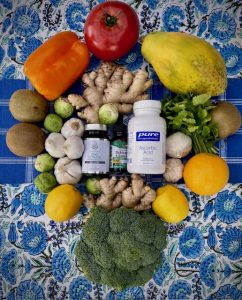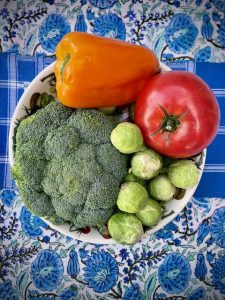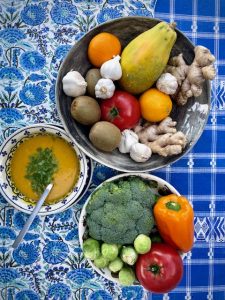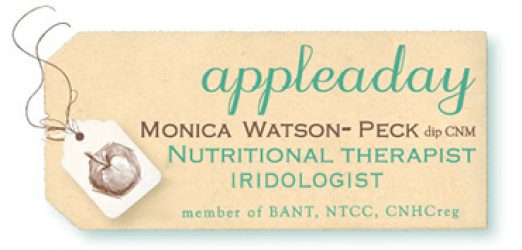Frosty cold days last week here in Dorset has prompted me to share a few of my favourite flu and cold remedies, a round-up of some easy herbals and nutrients.
Whether it’s a cold, flu or Covid there are loads of studies and articles showing how the nutrients below may work, either by shortening the duration of the infection, or by cutting down on the severity – or both.

Garlic (allium sativum)
Most of us will have a garlic bulb or two in the kitchen, ready to use if we suddenly feel a scratchy throat or the sniffles coming on. Garlic has so much science behind it, inhibiting viral reproduction, boosting our natural killer cells that help fight infection. Such an effective antibacterial, antifungal and antiviral.
It’s the allicin component in garlic that is responsible for its health benefits – and for its intense smell! Interestingly, this allicin is only released when you cut into the clove (which makes me often ponder about roasted whole bulbs; delicious, but not much antimicrobial action left).
Maximum benefit is when you eat garlic raw, but that won’t always work in daily life.
When cooked, some of that allicin might remain, especially if you keep to a light, quick steam, however, garlic’s Vit C, B6 and mineral content will be reduced, literally cooked away.
Add a clove or two of garlic to stews or soups at the last minute, just before serving, to keep as many of these benefits alive.
If you’re thick with cold or flu try a garlic broth, pouring hot water over a squeezed or chopped clove, adding grated ginger and miso paste, so easy to digest.
If colds are doing the rounds, a preventative drink to make is chopping 4 garlic cloves in a large preserve jar and topping with boiling water. Steep the garlic for about ½ hour then add lemon juice and honey, and drink warm as a ‘tea’ up to 3 or 4 times throughout the day.
Precautions:
Very high amounts, eg. a whole RAW bulb (unlikely, but good to be aware!), can cause digestive upset, heartburn, possibly diarrhoea.
Garlic can also increase bleeding so if you’re on an anti coagulant medication or have a bleeding disorder stick to minimal amounts in cooking, and, if planning to have surgery, avoid for at least 5 days beforehand.
Garlic may interfere with some chemo or HIV drugs as it can influence liver enzymes which help the metabolism of the drug you’re taking.
If pregnant, eating garlic in meals is fine, but high doses as a capsule or tablet are not generally recommended.
Ginger (zinziber officialis)
This is my go-to for everything. Ginger soothes aches and pains, helps alleviate nausea and digestive problems and is a great anti inflammatory. With a sore throat, drinking hot water with chopped ginger, lemon and honey will be soothing and supportive as it’s an effective antimicrobial. Ginger is also warming if you have chills, and it’ll help break a sweat with a fever.
The active ingredients are the gingerols, the main phenols, and shogaols, which inhibit respiratory pathogens and suppress the production of cytokines – chemicals we produce which lead to inflammation.
I like to start my day with chopped ginger in hot water, a herbal ‘tea’ I steep for 10 minutes, topping it up throughout the day and drinking either hot or cold. This summer I made ginger ice cubes, squeezing grated ginger into the ice tray, then adding the cubes to some cold water and pomegranate juice, delicious.
Like garlic, ginger adds flavour to stews, stir fries and soups and will retain more of its health benefits if added at the last minute.
Ready-bought ginger teabags have very little gingerol in them, however dried ginger is apparently high in these beneficial phenols. Important to find a reputable source; I recommend Steenbergs herbs and spices online store here in UK.
When full of cold or flu you may not feel like eating, however replacing the water lost from sweating is important. The above miso broth is great as a light, nutritious and hydrating meal or snack.
Precautions:
Ginger is a safe tuber/spice although high amounts may cause reflux…or, bizarrely, nausea (which, in normal amounts, it helps prevent).
Again, like garlic, it has a mild anti coagulant effect, hence if you’re on aspirin or have a bleeding disorder avoid large amounts.
Because ginger can increase bile production large amounts could potentially aggravate gall stones especially in supplement form.
Ginger in food is safe during pregnancy and can help with morning sickness.
Thyme (thymus vulgaris)
Thyme is another herb you might have growing in the garden, or in a pot in the kitchen. It’s easily found in most supermarkets. Thyme has a long history in the Mediterranean as a traditional medicinal plant that’s very effective for coughs and colds.
Not only does thyme contain vitamins and minerals (like garlic and ginger) but its essential oil, thymol, found in the leaves, has powerful antimicrobial properties, especially for upper respiratory infections, working well as an extectorant (clearing mucus).
Add fresh or dried thyme to stews, soups, stir fries, or use it in an infusion. Add one tablespoon of the herb to hot water, let steep for 15 minutes, then sieve out the leaves and either drink like that or add a little honey and/or lemon. With an active infection, sip throughout the day to soothe coughs and calm down inflammation in the airways.
Precautions:
If you have any mint family allergies, don’t use it.
Large doses – far greater than the amounts I’ve mentioned – can also cause nausea.
Thyme essential oil should never be ingested.
Thyme in food, fresh or dried, during pregnancy is safe, but, as it may cause uterine stimulation it’s best not to infuse/drink the above thyme tea.
Echinacea purpurea
Echinacea is an excellent broad spectrum antiviral as well as an antibacterial and antifungal. Often used to support upper respiratory infections, it works a.o. by stimulating the immune system through its bioactive phytochemicals.
Available in tincture or tablet form as well as echinacea herbal tea. The latter, however, isn’t nearly as well absorbed or immune effective.
It can be taken as a preventative, but I don’t recommend long term supplementation. When I travel I’ll often pack a small bottle of tincture so I can stop a cold in its tracks, dosing 30 drops 3 or 4x daily (this depends on the strength of the tincture, so check the label)
As a preventative, short term, 20-30 drops once a day or 1000 mg tablet is generally the recommended dose.
Precautions:
Due to echinacea stimulating the immune system, anyone with an auto immune disease should be cautious as it could potentially cause a flare. I’ll generally not recommend echinacea to auto immune clients unless they tell me they’ve tried it in the past and not had problems. There are enough other natural food-based antivirals to use.
If you have an allergy to ragweed or daisies, be aware that the flowering part of the Echinacea plant – not the root – can cause problems.

Ascorbic acid, aka Vitamin C
Vitamin C is probably the most researched nutrient as far as immune support goes, albeit a controversial one when it comes to dosage.
Again, like garlic and ginger, Vitamin C is shown to reduce the duration and severity of colds and flu. It improves the function of phagocytes – a type of white blood cell that engulfs viruses and bacteria in the blood stream -, and lymphocytes, another white blood cell which fights pathogens.
It also reduces inflammation by lowering the afore-mentioned pro-inflammatory cytokines and is a fab anti oxidant (which is a substance that protects cells from free radicals generated by infection, air pollution, stress, poor diet, smoke, pesticides…)
Foods containing good amounts of Vitamin C are often red or orange-coloured, like strawberries, papaya, mango, persimmons, oranges (all citrus in fact), acerola cherries (Malpighia emarginata), cantaloupe, kiwi fruit, guava, blackcurrants, bell peppers, chili peppers, tomatoes, but also green veg like broccoli, kale, parsley, Brussel sprouts…
Adding these vegetables to your diet when you have a cold will be beneficial overall, but they won’t have the therapeutic effects of lowering cold severity and duration that a supplement will offer.
Recommended dose for prevention, tablets or powder, for adults is c 500 – 1000 mg daily.
With an active cold or flu it’s safe to double this amount, and many will add that it’s safe to take 1000 mg every 3 hours, up to 10,000mg daily. This is very individual and research studies, pro and contra, are not always reliable or accurate, hence the controversy continues. Many swear by higher dose C.. and just as many don’t!
Saying all that, a useful indication that you may be over-supplementing is if you reach a point where stools become loose and possibly your gut will feel ‘off’.
Not dangerous, as the body will eliminate what it doesn’t need of this water-soluble vitamin, however, it’s a useful and sure indicator that whatever dosage you reached was too high for you; simply reduce the dose next time, or try buffered Vit C which is easier on the gut.
Also, don’t panic if your urine is yellow as that is the colour of Vit C leaving your body.
Precautions:
Kidney stones (esp oxalate stones) can be worsened by high Vitamin C supplementation. High doses may also interact with some chemo drugs and with glucose readings.
During pregnancy high doses are not recommended.
Zinc:
This trace mineral is another effective antioxidant which also works a.o. as an antiviral, inhibiting replication and blocking the virus entering the cells, especially rhino viruses.
Zinc lozenges are particularly useful for a scratchy throat. Best to start at the first onset of symptoms, sucking 3-4 over the course of the day, however not on an empty stomach as it can make you feel nauseous. Supplement doses vary from 15mg – 60mg, depending on the brand.
Foods containing zinc include oysters (high!), crustaceans, red meat, chicken, seeds and nuts – especially pine nuts – dairy products and some fortified cereals. Greens and mushrooms a.o. contain some zinc as well, however none of these foods will have the same therapeutic effects as supplementation.
As a preventative in the cold season, one tablet once daily, however if you’re taking a multi be aware of the amount of zinc in it so you’re not exceeding c 60mg.
Precautions:
Zinc can interfere with some medications such as cholesterol-lowering drugs if you take high doses. Zinc has been shown to be toxic at levels around 150mg.
Many zinc nasal sprays have been removed from the market as they were shown to lead to permanent loss of smell.
Chronic overuse can cause something called zinc-induced copper deficiency anaemia which results in neurological symptoms, so treat zinc with respect!

And there we go, my round-up of cold and flu remedies which I hope you’ll find useful.
There are of course more out there such as eucalyptus oil, so good for inhaling, or black elderberry syrup. If you have any other tried and tested favourites please share here below or on my social media pages.
Wishing you all a cold-free festive season wherever you are in the world x
(at the moment I would happily be sitting in this chair below!)

